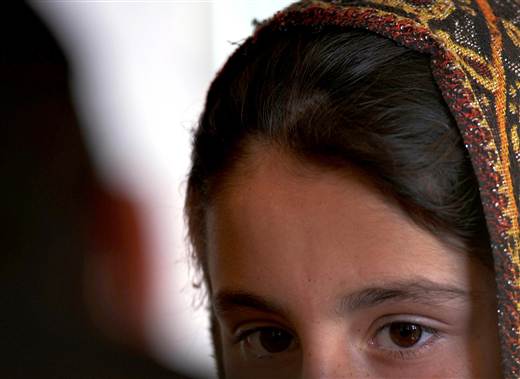Girls 'Treated as Cattle': Child Brides Divide Pakistan
BY WAJAHAT S. KHAN AND HENRY AUSTIN
LAMABAD, Pakistan -- A proposed law seeking tough new penalties for marrying children has triggered intense debate in Pakistan.
At the moment, females can legally tie the knot at 16 while males must wait until they are 18. However, it is customary for younger teen girls to be married by their families in some parts of the country. Girls are also sometimes offered as compensation to end feuds between families.
Anyone involved in underage wedlock currently faces a $10 fine, possibly accompanied by up to a month in jail. But lawmaker Marvi Memon is fighting for this to be increased to $1,000 - which is about a month's wage for a recent graduate working at a bank -- and a possible jail sentence of two years.
"These girls are being treated as cattle," Memon told NBC News. "They are dying. We cannot have little girls being married off at 15 and 16 and being forced to produce kids. It doesn’t make sense medically, and it doesn’t make sense economically."
According to UNICEF's State of the World's Children Report 2014, seven percent of Pakistani girls are married under the age of 15.
“Our prime objective is to ensure that our women are productive members of society,” Memon added. “For that to happen the injustices that are meted out to these child brides have to be curbed.”

Pakistani girl Saneeda, who escaped a forced marriage, tells her story to a journalist in December 2013.
Her bill in the country's National Assembly has been met with fierce opposition from Pakistan’s conservative religious parties, including her own. And some clerics want the penalties scrapped altogether. Pakistan's government does not track the issue or keep statistics on child marriage and few cases are reported to police.
Arguing that even the current laws forbidding child marriage contradict the Koran, the influential chair of the Council of Islamic Ideology (CII) has spoken out against the proposals.
Maulana Muhammad Khan Sherani believes that parliament could not legislate laws which are against the teachings of the Quran. He did not return repeated calls seeking comment from NBC News.
Gibran Peshimam, the political editor of Pakistan’s influentialExpress Tribune newspaper, highlighted that Sherani's advisory body wields considerable power.
“The CII’s edicts may not be legally binding, strictly speaking, but they have enough value to affect legislation," he said. “Basically, the CII is meant to interpret laws and legislation by done by parliament to ensure that the basic provision in Pakistan’s Constitution, that 'no law shall be made repugnant to the Quraan and Sunnah (the Muslim way of life),' is followed.'"
Under Islamic tradition, any person is free to marry after reaching puberty, according to Werner Menski, a professor of South Asian laws at SOAS, University of London.
After the Islamic contract of marriage has been agreed upon and a dowry paid, if the bride consents to marriage the argument has traditionally been that God has heard the offer. That makes it binding under Islamic law and sex would be permitted, Menski added.
“This leads to early pregnancy and very high risk pregnancy,” she said. “Younger girls are at a much higher risk of death and disability during pregnancy and their children are also at much higher risk of not surviving and dying as young children."
Warner said that early marriage "has an extremely negative impact on their lives."
She added: “They are not physically and mentally ready. They are almost always pulled out of school so their potential for education is cut off and with that, their potential to work and contribute to their societies both economically and socially.”
Marilyn Crawshaw, who is involved with a non-governmental organization that works with women in the Khyber Pakhtunkhwa region of Pakistan, said such marriages put girls' health and welfare at risk.
“If you children as some sort of bargaining chip or commodity that has a value attached to it, that is always bad for them," said Crawshaw, who is chairwoman of the UK Friends of Khwendo Kor. "The price is paid by the child."
“Islam is the religion which is the most progressive for women,” she said. “We are looking forward to the committee hearing where we will give Islamic arguments and data from Islamic countries to prove that the amendments we are suggesting are Islamic, democratic and progressive.”
Henry Austin reported from London. Reuters contributed to this report.
First published March 29th 2014, 10:46 am
Related News
- Asma Jahangir's funeral bridges religious and ethnic divides
- The silence at Lahore's Gaddafi Stadium during Asma's funeral was a reminder of what losing a champion sounds like
- FATAH: Pakistan’s lioness Asma Jahangir will never die
- Statement by the Coordination Committee of Special Procedures on the loss of Asma Jahangir, Special Rapporteur on the situation of human rights in the Islamic Republic of Iran
- Leading human rights lawyer Asma Jahangir passes away in Lahore
Related Actions
- SUDAN: URGENT ACTION - WOMEN RISK FLOGGING FOR ‘INDECENT’ CLOTHING
- Please acquit and release Asia Bibi
- On May 28, International Day of Action for Women’s Health, Women’s Rights Defenders Mobilize Worldwide Calling for the Inclusion of Women’s Sexual and Reproductive Health and Rights in the Post-2015 Development Agenda
- A Pakistani born Canadian Victim's Appeal for Help!
- Pakistan: Killing of NGO worker Farida Afridi in Jamrud Tehsil of Khyber Agency
Relevant Resources
- Shirkat Gah Newsheet March 2015
- Influences of Religious Fundamentalism on Sexual and Reproductive Health and Rights of Women
- Reclaiming and Redefining Rights: ICPD+20: Status of Sexual and Reproductive Health and Rights in the Middle East and North Africa
- Substantive Equality and Reproductive Rights: A Briefing Paper on Aligning Development Goals with Human Rights Obligations
- Child, early and forced marriage in Pakistan: A submission to OHCHR
